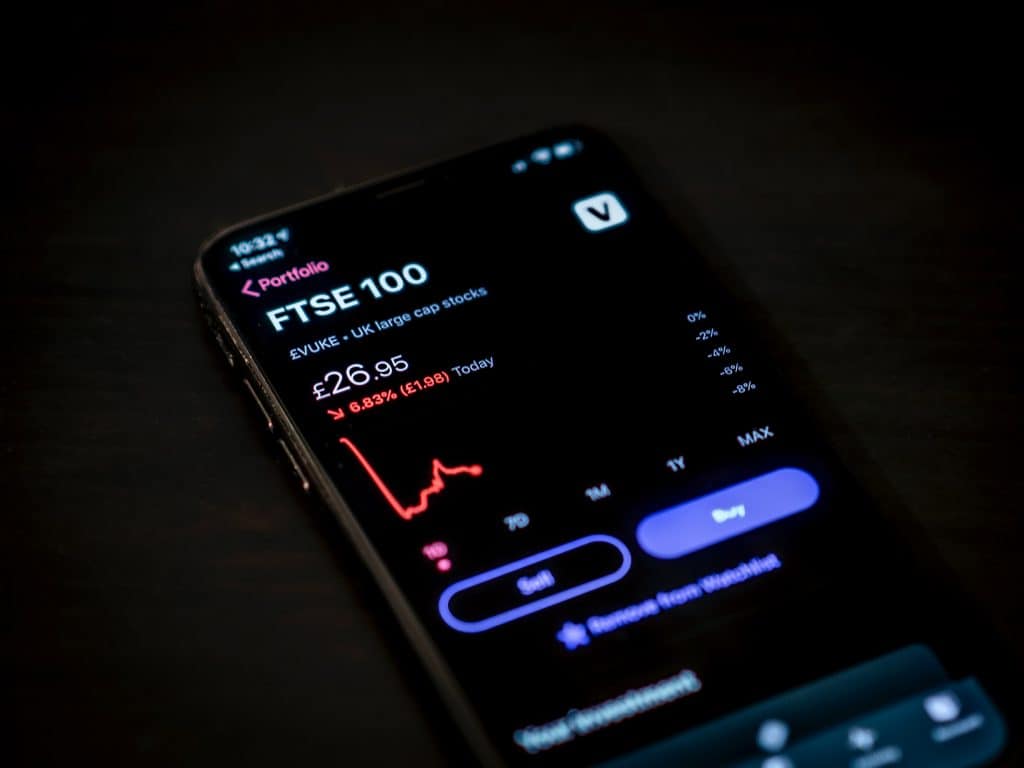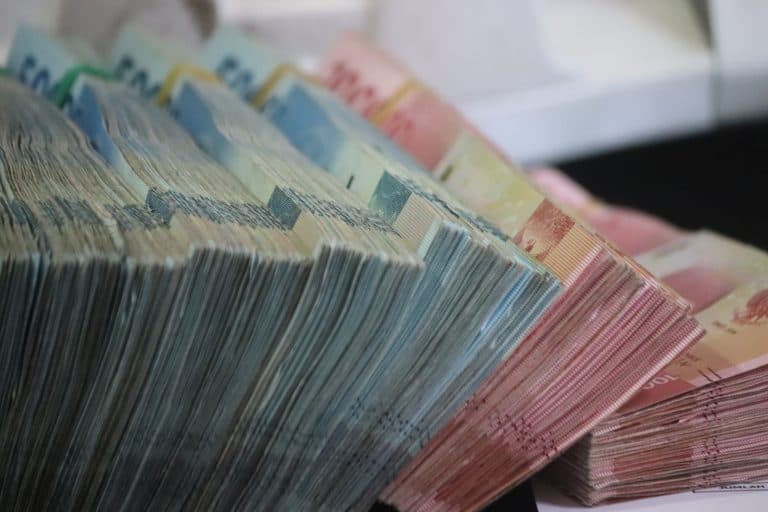Is the Stock Market Going to Crash? (don’t panic!)
It’s incredible how quickly things in the financial world can turn around, swinging wildly in opposite directions.
Over the last few years, the stock market consistently set new record after new record for all-time highs.
The economy was booming, investors were making money hand over fist, and everything looked like it was operating almost on autopilot.
For the last few years, the stock market and stock prices have seen their fair share of fits and starts.
Skyrocketing inflation numbers (touching a 40-year high recently) have thrown buckets of ice water on the super hot stock market performance.
We’ve seen the market drop in ways it never has before – including in February 2020, when the market plummeted 30% in a single month.
People with money in the market are understandably nervous that these rough and rocky times are just an appetizer for the devastation that’s to come.
This article will examine whether the stock market is going to crash and if it’s even that big of a deal!

Market crash vs market correction vs temporary decline
Language is important when it comes to the stock market.
Bleeding, crisis and disaster sell. Bear markets keep the headlines rolling
Thousands wiped of the stock market!
MARKET CRASH = surely this is the end of the world!
MARKET CORRECTION = just a price change to reflect their real price/today’s reality.
TEMPORARY DECLINE – a short-term drop in the price of the world’s great companies before they start their permanent advance again.
How you frame what is going on might well be what saves you from yourself.
Is there a market crash on the horizon?
It’s hard to say for certain what the future holds for the stock market.
Some people believe that a market crash is imminent, while others are hopeful that the market will rebound and continue to grow.
No one can predict exactly when or how a market crash will happen, but it’s important to be aware of your emotions in the run-up and through one.
The greatest risk to your investments is often how you react to the crisis of the day.
A stock market crash can’t be predicted!
Some indicators can signal there may be trouble ahead, but they don’t always lead to stock market declines.
High debt levels, inflated asset prices, and high or even low-interest rates can all be warning signs.
If you’re concerned about equity markets and a market decline, you likely need to revisit your financial plan.
Remember why you are investing in the stock market in the first place.
Don’t forget the difference between temporary declines and the permanent advancement of the stock market over the long term.
Ask yourself a few calming questions (hopefully)?
- What are you investing for?
- Are you diversified?
- Are you still thinking long-term or short-term?
- Do you need the money NOW?
- Can you ride out this crisis like all the others?
“Far more money has been lost by investors preparing for corrections, or trying to anticipate corrections than has been lost in corrections themselves.” – Peter Lynch
Can you “future proof” your wealth?
You can do a few things to try and future-proof your wealth in the event of a market crash / temporary decline.
First, make sure you have a diverse mix of investments.
Don’t put all your eggs in one basket! If the stock market takes a nosedive, you don’t want all your money to disappear with it.
Second, stay disciplined with your investment strategy. It can be tempting to want to cash out when the market is down, but if you do that, you’ll end up losing money in the long run.
Stick to your plan; don’t let emotions get in the way!
Third, don’t underestimate the power of cash. Having cash on hand gives you the flexibility to take advantage of opportunities that come up when the market crashes.
When everyone is selling, you can scoop up assets at a bargain price!
Fourth, keep an emergency fund. This is your safety net in case the stock market crashes, and you lose money.
Make sure you have enough saved up to cover at least six months of living expenses – that way, you know you’ll be able to weather the storm no matter what happens.
Is the Stock Market Going to Crash?
There isn’t a unified consensus amongst market and investment professionals that a stock market crash is just around the corner.
However, many (or at least almost everyone serious) agree that the market is dealing with some severe heartburn.
The S&P 500 dropped 20% from its high point just a short while ago. This sort of drop is often referred to as a bear market.
(A bull market is when it goes up and up)
Supply chain issues are still strangling global markets. Inflation is running rampant and shows no sign of slowing down anytime soon.
Things look pretty grim.
On top of that, market runs and crashes operate on a pretty cyclical basis.
This doesn’t mean that you can “time the market”. That’s next to impossible to do with any real consistency.
But it does mean that boom times and bull markets are inevitably brought to a screeching halt, and sometimes those rough downturns evolve into full-on market crashes / temporary decline.s
Things might not look great right now.
That’s not a reason to throw in the towel and shy away from investing.
No one knows whether or not it will turn into a global financial crisis and for how long.
Instead, you should anticipate temporary declines as a normal part of investing, protect yourself with an emergency fund, and improve your financial literacy through podcasts and books.
This way, you can spot the difference between the end of the world and just a resetting of the global economy.
What causes a market crash?
Stock market crashes / temporary declines are (generally) preempted by two specific things:
- A dramatic drop in stock market prices across the board, which is what we are seeing right now
- Followed by public panic across the board, which is something that we (for one reason or another) aren’t seeing a lot of right now
Most experts agree that the market has been flooded with a lot of “funny money” over the last few years, causing stock valuations to skyrocket without being tethered to concrete fundamentals.
This has turned the stock market into a bit of a casino more than anything else, blowing the market up into a bigger and bigger bubble – and bubbles always pop.
At the same time, even though things in the market look pretty nasty right now (there have been a lot of red days over the last few years), public panic in the market hasn’t been enough to tip it into a full-scale crash / temporary decline.
Some of that probably has to do with the entire economy being on fire right now.
People aren’t exclusively focused on stock market returns when they have to worry about supply chain issues, inflation, gas prices, housing prices, wages, and more.
On top of that, investors today recognize that the stock market is more of a long-haul kind of approach to generating wealth than a get-rich-quick, lottery ticket-style opportunity.
Stock markets and global financial crises have happened before.
They’ll happen again.
When and where stock market’s will fall is largely guesswork.
How to Protect Your Wealth When the Market Stalls
Luckily, even if the market crashes and you see the value of your portfolio tumble, you can do things to better protect your wealth and your financial future.
First, the important thing is that you avoid giving into the panic.
There’s going to be a lot of pressure on investors to sell, sell, sell when things start to take a nosedive.
That may or may not be the right move to make, but you need to be sure that you are making any market decisions based on savvy analysis and due diligence – not gut instinct or public pressure.
Secondly, you need to hammer out why you are investing in the world’s great companies (probably because this has always been a good way to build wealth over a long investment timeline)?
Again, it’s not hard to get swept up by market fever and start looking at your investments in a completely different light just because emotion has taken over.
Think about your portfolio.
Consider why you bought up certain stocks and avoided others.
Remember and reinforce that you purchased these investments to build LONG TERM wealth, not short-term speculation.
The stock market is a wealth-building machine through investing – not a short-term savings account.
It’ll help you weather the storm.
Third, it’s not a bad idea to lean into diversification when the market dips and start gobbling up stocks at dramatic discounts – but only if you have the spare cash.
It isn’t hard to find tons of stories throughout history showing investors transforming their financial future (generating life-changing amounts of wealth) by purchasing assets and investments when everyone else was cutting bait and running in the opposite direction.
Some of the world’s largest fortunes have been made by buying stocks “at a discount” when the market goes into a tailspin.
This might be more of an opportunity for you to succeed (and shortcut your path to real wealth) than it looks like on the surface.
FAQ: Is the stock market going to crash?
Will the stock market crash again?
It’s impossible to say for certain, but it’s certainly possible.
A lot can happen in a year, and several potential triggers could cause a stock market crash – from political instability to natural disasters.
One thing you can do to help protect yourself is to diversify your investments. Spread your money out among different stocks, funds, and asset classes, so you won’t lose everything if one investment falls in value. And remember to think long-term today’s crisis will be yesterday’s old story.
Good luck!
Should I pull my money from stocks?
No, you should not pull your money from stocks. The stock market is a long-term investment, and it is important to remember that short-term market dips are expected. In fact, over the long term, the stock market has always trended upwards.
By pulling your money from stocks, you would be locking in any losses you have incurred, and you would also be missing out on any potential gains. Instead, you should stay the course and continue to invest in stocks over the long term.
How do you know if the stock market is going to crash?
It’s impossible to predict a stock market crash with any real certainty. However, some indicators can indicate that a stock market crash / temporary decline may be on the horizon.
Some of the most common indicators of an impending stock market crash / temporary decline may include:
-A decline in the overall health of the economy
-A rise in unemployment rates
-A decline in consumer confidence
-A decline in corporate profits
-Rising interest rates
Is now a good time to buy stocks?
If your thinking long term then its always a good time to buy stocks.
The stock market is a long term wealth building machine. Its not tordays price that counts its what the price will be in 10, 20+ years that counts.
If prices have recently dipped then you might be able to by stocks in the great companies of the world at a discount price!
A temporary decline means a sale is on.
Is the market going to crash?
The short answer to is the market going to crash is, yes. But no one knows when, by how much or for how long.
What we do know up to now is that all stock market crashes have been more like temporary declines before the market advances higher again and again.
Market crashes are temporary ann no one know when it will happen but market advances over the long term have been permanent.
Closing Thoughts on is the stack market going to crash
Ultimately, it’s really hard to predict where the market will go from one day to the next.
All the signs are there for a stock market decline, but we may be looking at more of a controlled dissent where the market continues to go down, down, down over the next few months – or even over the next couple of years – before it bounces back and rebounds (like it always has!)
The one thing we can say with certainty right now is that the economy (and economies around the world) are really struggling.
That means you have to be smarter about your investments, take emotion out of the equation as much as possible, and try to take a longer-term look at how you can protect and generate more wealth moving forward.
If you want help weather a financial storm or how to invest and create financial freedom, sign up for our newsletter and set up a call.






